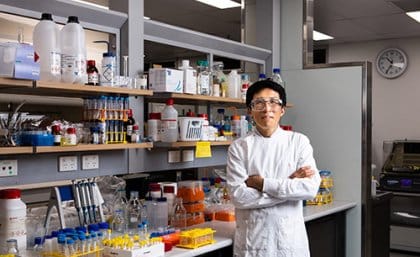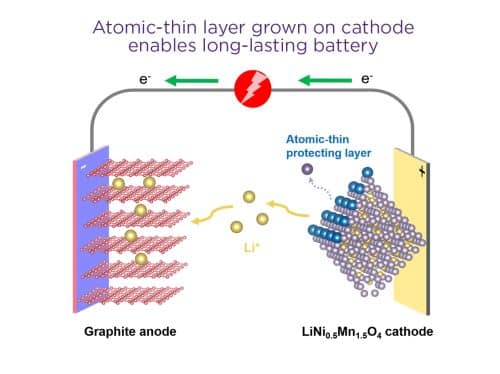Researchers at the University of Queensland have developed a technology that more than doubles the lifespan of highly sought-after high-voltage Li-ion batteries, which achieve higher energy density but last only several hundred cycles.
Professor Lianzhou Wang and his team from the School of Chemical Engineering and the Australian Institute for Bioengineering and Nanotechnology (AIBN) have demonstrated a battery that remains stable for more than 1000 charge/discharge cycles. Professor Wang notes that with the industry under increasing pressure to decarbonise, the development of lithium-ion batteries of lower cost, higher energy density, and longer cycle life was vitally important.

Epitaxy refers to the guided growth of a crystal on a crystalline substrate, where the atoms in an epitaxially growing layer are in registry with the atoms in the underlying substrate. “We’ve designed a uniquely-grown atomic-thin functional layer on the surface of a high-voltage cathode, which is the source of lithium ions and a critical aspect that limits the cycle life in a battery”, says Professor Wang.

Corrosion in one form or another is the reason why batteries degrade over time. Professor Wang mentions that this new approach features a minimal protective coating against corrosion, and this can pave the way for the deployment of these abundant high-voltage materials for the next generation high-energy batteries. “We’re confident the nanotechnology will have widespread applications across industry, including in consumer electronics, electric vehicles, and the energy storage sector,” he said.
This development has also been welcomed by other research companies like Brisbane-based R&D company VSPC Pty Ltd, which is focused on developing and commercialising advanced cathode materials for lithium-ion batteries. “New methods like the use of epitaxial surface layers to improve the cycling efficiency and cycle life of high-voltage cathodes are vital in the quest to improve the energy density of Li-ion batteries”, says Dr Rosalind Gummow, Technical Specialist from VSPC Pty Ltd. “The methods developed here also have potential to stabilise other cathode materials that degrade rapidly with cycling.”
Read the entire study here.









Yes, you are right and I would like to add few of my points. The life of a lithium ion battery depends on its usage. If you are using the laptop for basic tasks like web browsing, then the battery will last for a long time. But if you are using it for gaming or watching videos, it will drain faster. Thank you for sharing this blog with us. It was very interesting to read.